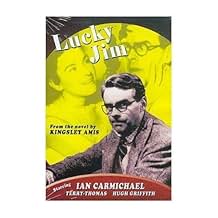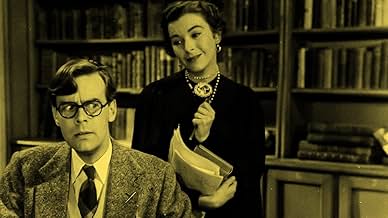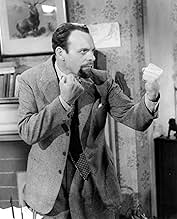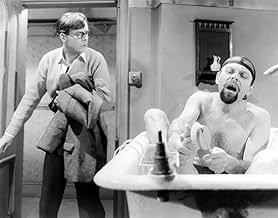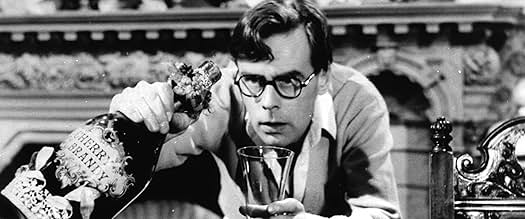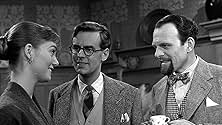Jim Dixon struggles with university work, Professor Welch's boring behavior, and his neurotic friend Margaret Peel. His misery is further complicated by his son Bertrand and companion Christ... Read allJim Dixon struggles with university work, Professor Welch's boring behavior, and his neurotic friend Margaret Peel. His misery is further complicated by his son Bertrand and companion Christine Callaghan.Jim Dixon struggles with university work, Professor Welch's boring behavior, and his neurotic friend Margaret Peel. His misery is further complicated by his son Bertrand and companion Christine Callaghan.
- Director
- Writers
- Stars
John Welsh
- The Principal
- (as John Welch)
Henry B. Longhurst
- Professor Hutchinson
- (as Henry Longhurst)
- Director
- Writers
- All cast & crew
- Production, box office & more at IMDbPro
Featured reviews
Jim Dixon is a junior lecturer at an unnamed provincial university. Kingsley Amis, who wrote the novel on which this film is based, took his title from a song- "Oh, lucky Jim, How I envy him..." (We hear this song a couple of times during the film). As the story opens, however, Jim does not seem to be particularly lucky or enviable. Indeed, his life can be summed up in the words of the theme-song from "Friends":-
"Your job's a joke, you're broke, your love life's D. O. A."
He hates his job and his boss, Professor Welch. He is perpetually short of cash and forced to live in a seedy lodging-house. His relationship with his possessive, needy girlfriend Margaret appears to be going nowhere and, while he has set his cap at an attractive blonde named Christine, that relationship also appears to be doomed as she is the girlfriend of Welch's novelist son Bertrand.
The novel has long been a favourite of mine, but I have never had the same affection for the film version, largely because the film-makers never manage to find an equivalent for Amis's bitingly satirical authorial voice. Scenes which are brilliantly funny in the book, such as Professor Welch's disastrous musical weekend, in the course of which Jim manages to set fire to his bed, or the one in which Jim delivers a lecture while drunk, never come to life in the same way on the screen. The scriptwriters also include some episodes of slapstick humour not found in the book, such as Jim's attempt to organise the floral decorations at an academic ceremony or the chase scene at the end, but these are no substitute for Amis's savage wit.
Ian Carmichael was later to gain a reputation for playing upper-class characters such as Bertie Wooster or the aristocratic detective Lord Peter Wimsey, but in 1957 these productions still lay in the future. Even so he still seems a bit too posh for Jim, who is supposed to be a working-class Northerner, as well as a bit too old at 37. This means that the question of social class, an important theme in the novel, is rather avoided in the film. Contrary to what one reviewer writes, Amis, who in 1954 still considered himself to be on the Left, was not using "Lucky Jim" to satirise well-heeled bourgeois Leftists. (Later, when he had moved sharply to the Right, he was to lay into radical-chic champagne socialists with gusto in novels like "Girl, 20" from 1971). Professor Welch, with his romantic fantasies of some pre-modern pre-industrial "Merrie England", is a nostalgia-obsessed cultural conservative, and Bertrand probably a political one.
The Jim of the novel is in many ways a flawed character. For one who hopes to make a living by teaching history, he displays a surprising lack of enthusiasm for his subject. He drinks too much, often treats Margaret badly and can be rude and tactless. He devotes a lot of energy to pursuing feuds against those who annoy him and can be oddly childish. The character in the film is very much watered down in an attempt to make him more likeable; this attempt succeeds to some extent, but at the cost of also making him less interesting.
Maureen Connell's Margaret is less neurotic, hysterical and manipulative here than she is in the book, and as a result becomes completely forgettable. Sharon Acker's Christine is almost equally so. (Christine was English in the book but here becomes Canadian, possibly in order to make the film more marketable in North America). Those characters in the film who do stand out tend to be those who are played in the same way as they are in the novel, notably Hugh Griffith's absent-minded, evasive, pedantic and pretentious Professor Welch and Terry-Thomas's pompous, self-important, snobbish and bullying Bertrand. (Like Carmichael, however, Terry-Thomas at 46 was really too old. He was actually a year older than Griffith who plays his father).
The film is not altogether a bad one and can provide a few amusing moments. When one considers how good its source novel is, however, it really should have been a lot better. 6/10.
"Your job's a joke, you're broke, your love life's D. O. A."
He hates his job and his boss, Professor Welch. He is perpetually short of cash and forced to live in a seedy lodging-house. His relationship with his possessive, needy girlfriend Margaret appears to be going nowhere and, while he has set his cap at an attractive blonde named Christine, that relationship also appears to be doomed as she is the girlfriend of Welch's novelist son Bertrand.
The novel has long been a favourite of mine, but I have never had the same affection for the film version, largely because the film-makers never manage to find an equivalent for Amis's bitingly satirical authorial voice. Scenes which are brilliantly funny in the book, such as Professor Welch's disastrous musical weekend, in the course of which Jim manages to set fire to his bed, or the one in which Jim delivers a lecture while drunk, never come to life in the same way on the screen. The scriptwriters also include some episodes of slapstick humour not found in the book, such as Jim's attempt to organise the floral decorations at an academic ceremony or the chase scene at the end, but these are no substitute for Amis's savage wit.
Ian Carmichael was later to gain a reputation for playing upper-class characters such as Bertie Wooster or the aristocratic detective Lord Peter Wimsey, but in 1957 these productions still lay in the future. Even so he still seems a bit too posh for Jim, who is supposed to be a working-class Northerner, as well as a bit too old at 37. This means that the question of social class, an important theme in the novel, is rather avoided in the film. Contrary to what one reviewer writes, Amis, who in 1954 still considered himself to be on the Left, was not using "Lucky Jim" to satirise well-heeled bourgeois Leftists. (Later, when he had moved sharply to the Right, he was to lay into radical-chic champagne socialists with gusto in novels like "Girl, 20" from 1971). Professor Welch, with his romantic fantasies of some pre-modern pre-industrial "Merrie England", is a nostalgia-obsessed cultural conservative, and Bertrand probably a political one.
The Jim of the novel is in many ways a flawed character. For one who hopes to make a living by teaching history, he displays a surprising lack of enthusiasm for his subject. He drinks too much, often treats Margaret badly and can be rude and tactless. He devotes a lot of energy to pursuing feuds against those who annoy him and can be oddly childish. The character in the film is very much watered down in an attempt to make him more likeable; this attempt succeeds to some extent, but at the cost of also making him less interesting.
Maureen Connell's Margaret is less neurotic, hysterical and manipulative here than she is in the book, and as a result becomes completely forgettable. Sharon Acker's Christine is almost equally so. (Christine was English in the book but here becomes Canadian, possibly in order to make the film more marketable in North America). Those characters in the film who do stand out tend to be those who are played in the same way as they are in the novel, notably Hugh Griffith's absent-minded, evasive, pedantic and pretentious Professor Welch and Terry-Thomas's pompous, self-important, snobbish and bullying Bertrand. (Like Carmichael, however, Terry-Thomas at 46 was really too old. He was actually a year older than Griffith who plays his father).
The film is not altogether a bad one and can provide a few amusing moments. When one considers how good its source novel is, however, it really should have been a lot better. 6/10.
It's hard for me to be objective about this film, as it is adapted from my favorite novel--which I've read eight or nine times. Also, I waited so long to see it that it may have been inevitable that I would ultimately be disappointed. Ironically, I first heard about the film some years before I read the book, and it was only after I read the book that I made the connection between it and the description my brother had once given me. It would be about 20 years (no kidding!) before I finally saw the film myself. I've now seen it twice and mostly hated it both times.
Kingsley Amis's LUCKY JIM was obligatory reading among history students when I was in grad school 30 years ago. The story about an unhappy history instructor in a crummy British provincial university expressed a lot of the angst that we felt as grad students, and it was funnier than heck as well. I loved the book then, and still love all these years later. Why, then, was the film such a disappointment? Mainly because the script muted much of the savageness of Amis's humor, and because it tacked on an idiotic chase scene at the end that has nothing whatever to do with the original story--or even with what goes before it in the film. (Even Ian Carmichael--who played Jim--hated that ending. He told me that the people making the film didn't seem to have any idea of what they were doing--and it shows.)
The producers also added a very unsatisfactory and irrelevant academic procession in them middle of the film--evidently for the sole purpose of making Carmichael look like a klutz by having him tripping over flowerpots and dropping things in the middle of the solemn affair.
Nevertheless, the film does have its virtues, chief among them is excellent casting. Ian Carmichael was born to play Jim. Terry-Thomas was properly unctuous as Bertrand; Hugh Griffith certainly looked the part as Professor Neddy; Maureen Connell looked like I imagined the neurotic Margaret Peel; and Sharon Acker made a fine-looking Christine Callaghan.
Kingsley Amis's LUCKY JIM was obligatory reading among history students when I was in grad school 30 years ago. The story about an unhappy history instructor in a crummy British provincial university expressed a lot of the angst that we felt as grad students, and it was funnier than heck as well. I loved the book then, and still love all these years later. Why, then, was the film such a disappointment? Mainly because the script muted much of the savageness of Amis's humor, and because it tacked on an idiotic chase scene at the end that has nothing whatever to do with the original story--or even with what goes before it in the film. (Even Ian Carmichael--who played Jim--hated that ending. He told me that the people making the film didn't seem to have any idea of what they were doing--and it shows.)
The producers also added a very unsatisfactory and irrelevant academic procession in them middle of the film--evidently for the sole purpose of making Carmichael look like a klutz by having him tripping over flowerpots and dropping things in the middle of the solemn affair.
Nevertheless, the film does have its virtues, chief among them is excellent casting. Ian Carmichael was born to play Jim. Terry-Thomas was properly unctuous as Bertrand; Hugh Griffith certainly looked the part as Professor Neddy; Maureen Connell looked like I imagined the neurotic Margaret Peel; and Sharon Acker made a fine-looking Christine Callaghan.
This is an outstanding movie whose meticulously-crafted set pieces frequently had me in stitches. Superbly cast, Ian Carmichael, Hugh Griffiths and Terry-Thomas were in exceptional form, and the luminous beauty of Sharon Acker lights up the film. If you don't find this funny, charming and uplifting, all I can say is that I feel sorry for you!
The pompous, stiff and class-deferential era of the 1950s is marvellously evoked in this movie. Always the sign of a classic, even the minor characters - Mrs Welch, the taxi driver, the waiter and the university porter, for instance - all hold their own and come across as real people. The appalling persona of Bertrand Welch (Terry-Thomas) with his self-obsessed sense of his own importance is excellently drawn. One to see and quite possibly one to keep.
The pompous, stiff and class-deferential era of the 1950s is marvellously evoked in this movie. Always the sign of a classic, even the minor characters - Mrs Welch, the taxi driver, the waiter and the university porter, for instance - all hold their own and come across as real people. The appalling persona of Bertrand Welch (Terry-Thomas) with his self-obsessed sense of his own importance is excellently drawn. One to see and quite possibly one to keep.
Kingsley Amis might not had liked the adaptation of his novel set in a redbrick university in 1950s Britain when university education started to expand and took on some working class students. The Boulting brothers film comes across a little too much of an Ealing comedy for my liking with slapstick and loses the novel's edge.
Ian Carmichael is the northern grammar school boy made good but looking for a permanent teaching job at the university. To do this he has to toady to Professor Welch and his family and every task he is entrusted to do ends in disaster sometimes due to Jim's shortcomings.
As a lecturer Jim is passionate with a leftist slant on history in contrast with Professor Welch dull and old fashioned musings which we see when Jim has to deliver Welch's lecture.
In between we have Jim getting into escapades with Terry Thomas and his Canadian girlfriend and a slapstick scene involving a parade with flowers on the quadrant of the university.
However whilst Carmichael is spirited as Jim he looks too old, even worse Terry Thomas looks too old as the son of the Professor Welch.
The film is episodic and although starts promisingly enough it tries too hard to be an Ealing style comedy rather than a satirical adaptation. The redbrick university never convinces maybe I have seen too many of these places that were built in the 1960s.
Ian Carmichael is the northern grammar school boy made good but looking for a permanent teaching job at the university. To do this he has to toady to Professor Welch and his family and every task he is entrusted to do ends in disaster sometimes due to Jim's shortcomings.
As a lecturer Jim is passionate with a leftist slant on history in contrast with Professor Welch dull and old fashioned musings which we see when Jim has to deliver Welch's lecture.
In between we have Jim getting into escapades with Terry Thomas and his Canadian girlfriend and a slapstick scene involving a parade with flowers on the quadrant of the university.
However whilst Carmichael is spirited as Jim he looks too old, even worse Terry Thomas looks too old as the son of the Professor Welch.
The film is episodic and although starts promisingly enough it tries too hard to be an Ealing style comedy rather than a satirical adaptation. The redbrick university never convinces maybe I have seen too many of these places that were built in the 1960s.
I don't think this 1950's Boulting Brothers comedy dramatisation of Kingsley Amis's novel has aged well. It purports to mock upper-class academia of the time through the vessel of Ian Carmichael's title character (cue madrigal singers) as he gently rocks up against his so-called superiors and betters and supposedly knocks them down a peg or two with his freshness, unconventionality and honesty. It's funny how in so doing he comes off himself as a rather eccentric upper-class toff, one who you believe could still end up as one of the stuffy establishment figures he's presumably meant to contrast with.
It doesn't help that Carmichael is much too old in the part. The Angry Young Men were starting to make waves in British theatre and cinema at the time but here all we get a mildly querulous, getting-on-somewhat man blundering and blustering from one unlikely situation to another. The three main comedic set-pieces of Jim (cue madrigal singers) playing in an impromptu musical gathering at his college superior's house, disastrously arranging the floral display of the university procession to be attended by the new college chancellor and lastly his drunkenly irreverent speech on the designated theme of "Merrie England" in front of the assembled pupils and masters all fall flat with the only time I was remotely amused being when in his drunken state he predictably finds himself in the bedroom of his torch-carrying old-maid admirer and proceeds to shoot over the proverbial open goal. Somehow, in all this, he still gets the pretty young girl although the fact that his competition is Terry Thomas in an unsympathetically written-part makes that a foregone conclusion almost from their first meeting.
I see that contemporary critics compared Carmichael's performance as Jim (cue madrigal singers) with that of Jerry Lewis which somehow manages to insult them both. No one else in the cast stood out for me either although they were none of them helped by the dull screenplay and stodgy direction. If this is what passed for rebelliousness in late 50's British cinema, I can only say I'm glad that the so-called kitchen sink dramas with genuinely vibrant young talent like Finney, Harvey, Bates and Courteney were just around the corner.
Oh and those madrigal singers will infuriate you with every chorus!
It doesn't help that Carmichael is much too old in the part. The Angry Young Men were starting to make waves in British theatre and cinema at the time but here all we get a mildly querulous, getting-on-somewhat man blundering and blustering from one unlikely situation to another. The three main comedic set-pieces of Jim (cue madrigal singers) playing in an impromptu musical gathering at his college superior's house, disastrously arranging the floral display of the university procession to be attended by the new college chancellor and lastly his drunkenly irreverent speech on the designated theme of "Merrie England" in front of the assembled pupils and masters all fall flat with the only time I was remotely amused being when in his drunken state he predictably finds himself in the bedroom of his torch-carrying old-maid admirer and proceeds to shoot over the proverbial open goal. Somehow, in all this, he still gets the pretty young girl although the fact that his competition is Terry Thomas in an unsympathetically written-part makes that a foregone conclusion almost from their first meeting.
I see that contemporary critics compared Carmichael's performance as Jim (cue madrigal singers) with that of Jerry Lewis which somehow manages to insult them both. No one else in the cast stood out for me either although they were none of them helped by the dull screenplay and stodgy direction. If this is what passed for rebelliousness in late 50's British cinema, I can only say I'm glad that the so-called kitchen sink dramas with genuinely vibrant young talent like Finney, Harvey, Bates and Courteney were just around the corner.
Oh and those madrigal singers will infuriate you with every chorus!
Did you know
- TriviaAt 46 Terry-Thomas was a year older than Hugh Griffith, who played his father. Jean Anderson, playing his mother, was only 4 years older than Thomas.
- GoofsThe taxi used by Jim and Christine when leaving the ball has 'Taxi' on a paper sign in the windscreen which is not there in long shot.
- Crazy creditsOpening credits prologue: A Redbrick University in Britain's new Elizabethan age: here are moulded the intellectual Drakes and Raleighs of tomorrow - fearless, independent - and state supported
- ConnectionsReferenced in The Bill: Lucky Jim (1999)
- How long is Lucky Jim?Powered by Alexa
Details
- Release date
- Country of origin
- Language
- Also known as
- Volltreffer ins Glück
- Filming locations
- The Royal Masonic School, Bushey, Hertfordshire, England, UK(red-brick university where Jim works)
- Production companies
- See more company credits at IMDbPro
- Runtime
- 1h 35m(95 min)
- Color
Contribute to this page
Suggest an edit or add missing content

